新概念英语第一册55-56
新概念英语第一册课后习题及答案:Lesson55-56

新概念英语第一册课后习题及答案:Lesson55-56 Written exercises书面练习A Comlete these sentences using-s or -es.完成以下句子,根据需要在动词后面加上-s或-es。
Example:She wash ______the dishes every day.She washes the dishes every day.1 The children go ______to school in the morning.2 Their father take ______them to school.3 Mrs. Sawyer stay ______at home.4 She do ______the housework.5 She always eat ______her lunch at noon.B Write questions and answers.模仿例句提问并回答。
Example:she/morning often/dust/the cupboardWhat does she do in the morning?She often dusts the cupboard in the morning.1 she/morning always/make/the bed2 he/morning always/shave3 they/evening sometimes/listen to/the stereo4 he/every day always/clean/the blackboard5 they/night always/go/to bed early6 she/every day usually/wash/the/dishes7 they/afternoon usually/type/some letters8 it/every day usually/drink/some milk9 they/evening sometimes/watch/television10 she/noon always/eat/her lunch11 he/evening often/read/his newspaper答案:Lesson 56A1 The children go to school in the morning.2 Their father takes them to school.3 Mrs. Sawyer stays at home.4 She does the housework.5 She always eats her lunch at noon.B1 What does she do in the morning? She always makes the bed in the morning.2 What does he do in the morning? He always shaves in the morning.3 What do they do in the evening? They sometimes listen to the stereo in the evening.4 What does he do every day? He always cleans the blackboard every day.5 What do they do at night? They always go to bed early at night.6 What does she do every day? She usually washes the dishes every day.7 What do they do in the afternoon? They usually type some letters in the afternoon.8 What does it do every day? It usually drinks some milk every day.9 What do they do in the evening? They sometimes watch television in the evening.10 What does she do at noon? She always eats her lunch at noon.11 What does he do in the evening? He often reads his newspaper in the evening.。
新概念英语第一册lesson55-56(推荐完整)

housework n.家务
Do you often do housework at home? clean the floor / wash the dishes cook dinner
lunch 午饭 breakfast supper dinner(较正式,一般指晚宴) meal [mi:l] 餐 have a big meal
Analyze of the passage
take Please take me with you. take care / take good care of take away see friends visit friends from 从…
from 从……
He is from Sweden. back from work I just back form GZ. then 然后 I always eat, then go the bed. and then First, open your book, and then… 先听录音,然后回答问题。
afternoon 下午
noon 中午,正午 = midday at noon = at midday 在正午 in the morning in the afternoon in the evening at night/noon I often watch TV at night.
usually adv.通常
Key Structures
1.Mr. Sawyer stays at home every day. 2.She always eats her lunch at noon. 3.She usually sees her friends. 4.They often drink tea together. 5.The children always do their homework 6. Mr. Sawyer usually reads his
新概念英语第一册Lesson-55-56 The Sawyer family

n. 下午
New words
usually together evening arrive night
['juʒuəli] [tə'geðə] ['iːvnɪŋ] [ə'raɪv] [naɪt]
adv. 通常 adv. 一起 n. 晚上 v. 到达 n. 夜间
New words
• 形容词性物主代词具有形容词的特性,常放在名词前面作定语, 表明该名词所表示的人或物是\谁的\或xx belongs to sb.
lunch n.午饭
eat lunch = have lunch 吃午饭 一日三餐前的冠词必须省略,而且,表示吃饭的“吃”
既可用 eat ,也可用 have 吃早饭 eat(have) breakfast 吃晚饭 eat(have) supper(英)
eat(have) dinner (美)
morning n.早上
The text
3
Let’s learn the dialogue:
First listen to the tape and answer this question.
When do the children do their homework?
When do the children do their homework? At night, before they go to bed.
此段使用的是哪个时态? 上文中出现了几个动词?分别是哪些?
这些动词的共同点是什么?
一般现在时
• 1.定义:表示经常反复发生的动作或存在的状态。 • 2.标志词:often usually sometimes always never
新概念英语第一册Lesson55~60语法及单词解析

新概念英语第一册Lesson55~60语法及单词解析新概念英语第一册Lesson55~56语法及单词解析语法 Grammar in use一般现在时(请参见第47-48课_A cup of coffee语法部分。
)一般现在时用于表示一个习惯动作、有规律的行为以及永恒的现象。
一般与时间频度副词和时间短语连用。
这些时间短语有:every day/week/month/year 每日/周/月/年in the morning/afternoon/evening 在上午/下午/晚上at noon/night 在正午/夜里第3人称单数的谓语动词需加以变位,这可分为几种情况:(1)直接加 -s,如:come----comesarrive----arrives(2)以 -sh, -ch, -o 以及 -s结尾的动词加 -es,如:wash----washesgo----goeswatch----watchesdo----does(3)以辅音加 -y结尾的动词,把 -y改成 -i,再加 -es;而元音加 -y结尾的动词,只加 -s即可:hurry----hurriescarry----carriesplay----playsstay----stays词汇学习 Word study1.arrive v.(1)到达;到来:We arrived home early.我们很早就到家了。
The train is expected to arrive in London at 8. 20 p. m.火车预计在晚上8点20分抵达伦敦。
(2)(时间等)来临;(婴儿)出生:At last the day of graduation arrived.毕业的那一天终于来临。
Elizabeth's baby arrived at midnight.伊丽莎白的婴儿是在午夜时分降生的。
2.live v.(1)居住;生活:Frank lives in Paris.弗兰克居住在巴黎。
新概念英语第一册自学笔记含课后练习答案:Lesson55-56
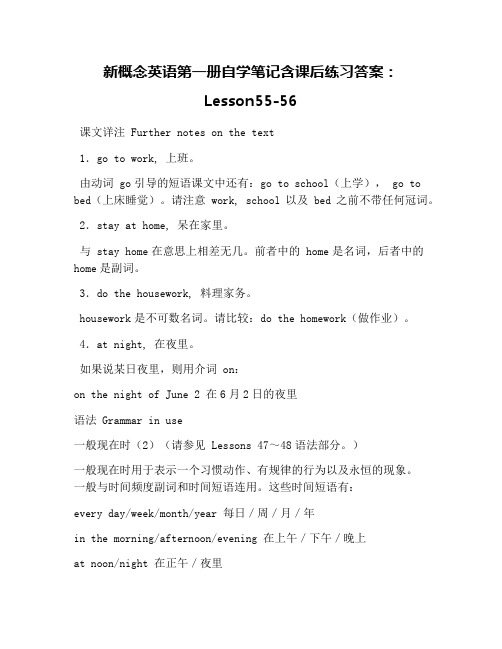
新概念英语第一册自学笔记含课后练习答案:Lesson55-56课文详注 Further notes on the text1.go to work, 上班。
由动词 go引导的短语课文中还有:go to school(上学), go to bed(上床睡觉)。
请注意 work, school以及 bed之前不带任何冠词。
2.stay at home, 呆在家里。
与 stay home在意思上相差无几。
前者中的 home是名词,后者中的home是副词。
3.do the housework, 料理家务。
housework是不可数名词。
请比较:do the homework(做作业)。
4.at night, 在夜里。
如果说某日夜里,则用介词 on:on the night of June 2 在6月2日的夜里语法 Grammar in use一般现在时(2)(请参见 Lessons 47~48语法部分。
)一般现在时用于表示一个习惯动作、有规律的行为以及永恒的现象。
一般与时间频度副词和时间短语连用。
这些时间短语有:every day/week/month/year 每日/周/月/年in the morning/afternoon/evening 在上午/下午/晚上at noon/night 在正午/夜里第3人称单数的谓语动词需加以变位,这可分为几种情况:(1)直接加 -s,如:come----comesarrive----arrives(2)以 -sh, -ch, -o 以及 -s结尾的动词加 -es,如:wash----washesgo----goeswatch----watchesdo----does(3)以辅音加 -y结尾的动词,把 -y改成 -i,再加 -es;而元音加-y结尾的动词,只加 -s即可:hurry----hurriescarry----carriesplay----playsstay----stays词汇学习 Word study1.arrive v.(1)到达;到来:We arrived home early. 我们很早就到家了。
新概念英语第一册Lesson 55-56练习题
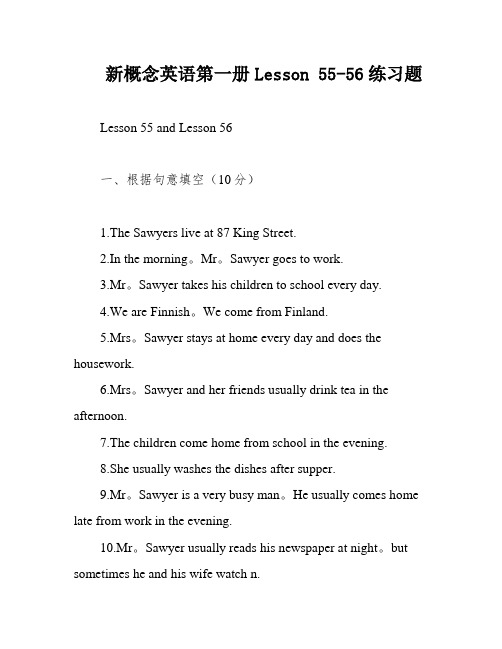
新概念英语第一册Lesson 55-56练习题Lesson 55 and Lesson 56一、根据句意填空(10分)1.The Sawyers live at 87 King Street.2.In the morning。
Mr。
Sawyer goes to work.3.Mr。
Sawyer takes his children to school every day.4.We are Finnish。
We come from Finland.5.Mrs。
Sawyer stays at home every day and does the housework.6.Mrs。
Sawyer and her friends usually drink tea in the afternoon.7.The children come home from school in the evening.8.She usually washes the dishes after supper.9.Mr。
Sawyer is a very busy man。
He usually comes home late from work in the evening.10.Mr。
Sawyer usually reads his newspaper at night。
but sometimes he and his wife watch n.二、英汉互译下列短语(10分)1.The Greens 格林一家2.go to work 上班3.stay at home 呆在家里4.at noon 中午5.see her friends 见她的朋友e home from school 放学回家e home late 晚到家8.do their homework 做他们的家庭作业9.go to bed 去睡觉10.listen to the。
新概念英语第一册Lesson55-56笔记(语法点+配套练习+答案)
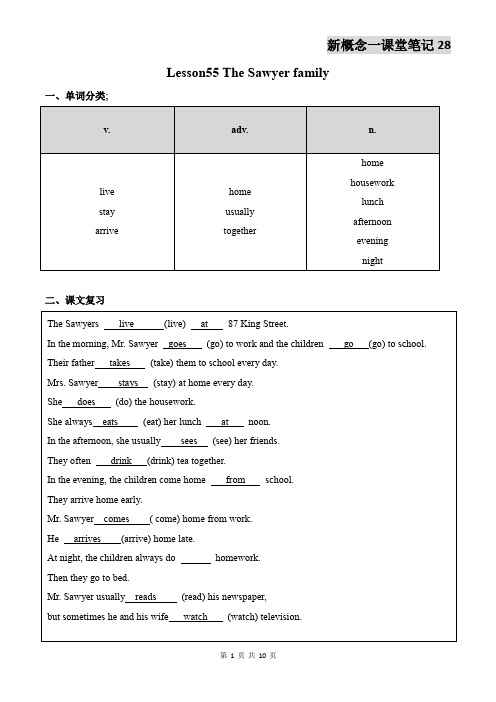
nightn.夜间
atnight在晚上
atnoon在中午
The koala sleepsinthe day and movesatnight.
I don’t go homeatnoon.
The Sawyer family
live at +小地点
living thing生物
living way生活方式
life n.生活,生命
I liveat58 Huanghe Road.
He livesinEngland.
The old man likes livinginthe country.
Different people have their differentliving ways .
The baby like stayingwithits mother.
Get up! Don’t stayinbed.
home
n.家
adv.在家,到家
at home在家
stay at home呆在家
go home回家
arrive home到家
I have a beautifulhomein Zhangzhou.(n.)
看电视
at noon
在中午
make the bed
铺床
in the afternoon
在下午
wash the dishes
刷盘子
at night
在晚上
type a letter
打信
5、语法解析
1.一般现在时
定义:1.(fact)客观事实或客观真理
新概念英语第一册55-56课详解

新概念英语第一册55-56课详解Lesson 55-56 of New Concept English Book 1 Detailed Explanation.Lesson 55: The Sawyer Family.Vocabulary and Expressions:live [lɪv] v.: This verb has multiple meanings. Firstly, it can mean to reside or habitually inhabit a place. For example, "I live in Hefei." Secondly, it can mean to exist or be alive, as in "People cannot live without air." Lastly, it can be used in the expression "live a/an... life" to describe the way someone lives their life.stay [steɪ] v.: This Verb primarily means to remain in a place for a period of time. It can also be used figuratively to mean "remain" in a certain state or condition, as in "stay hungry, stay foolish."home [həʊm] n./adv.: As a noun, it refers to the place where one lives. As an adverb, it means "to the place where one lives," as in "go home."housework ['haʊswɜːk] n.: This noun refers to the tasks related to maintaining a household, such as cleaning, cooking, and laundry.lunch [lʌnʃ] n.: This noun refers to the meal eaten in the middle of the day.afternoon [ɑːftə'nuːn] n.: This noun refers to the period of time between noon and evening.Text Explanation:Lesson 55 introduces the Sawyer family and their daily routine. The lesson begins by introducing the family members and their occupations. Mr. Sawyer works in an office, while Mrs. Sawyer stays at home. The children go to school. The lesson then goes on to describe their eveningactivities. Mr. Sawyer usually arrives home from work at about five o'clock, and the family then has their lunch together. In the afternoon, they often have a rest, andthen in the evening, they usually stay at home and watch television.Grammar Points:The use of "-s" or "-es" to form the third-person singular present tense of verbs is reinforced in this lesson. For example, "Mr. Sawyer usually arrives home from work at about five o'clock."The use of prepositions with "live" is also introduced. For example, "Mr. Sawyer lives in a town near London,"where "in" is used with a large place, and "Mrs. Sawyerlives at 87 King Street," where "at" is used with aspecific address.Lesson 56: What Do They Do?Vocabulary and Expressions:together [tə'geðə] adv.: This adverb means "in a group" or "side by side."evening ['iːvnɪŋ] n.: This noun refers to the time of day that comes after afternoon and before night.arrive [ə'raɪv] v.: This Verb means to reach a destination after a journey.night [naɪt] n.: This noun refers to the period of time from sunset to sunrise.Text Explanation:Lesson 56 continues the theme of the Sawyer family's daily life by asking the question, "What do they do?" The lesson provides information about the family's evening activities. Mr. Sawyer usually arrives home from work at about five o'clock, and then the family has their tea together. After tea, they usually sit in the living room and watch television. Sometimes, they go to the cinema orto the theater. On Sundays, they often go for a walk in the park.Grammar Points:The present tense of verbs is reinforced in this lesson, particularly the use of the third-person singular form.The lesson also introduces the use of modal verbs such as "can" and "usually" to express ability and frequency.Conclusion:Lessons 55 and 56 of New Concept English Book 1 focus on the Sawyer family's daily routine and activities. These lessons introduce new vocabulary and expressions related to family life, daily activities, and grammar points such as the use of "-s" or "-es" in the third-person singular present tense and the use of modal verbs. By learning these lessons, students can improve their understanding of family life in English-speaking countries and enhance theirlanguage skills in areas such as vocabulary, grammar, and comprehension.。
英语新概念一Lesson 55-56练习

英语新概念一Lesson 55-56练习填空。
1.去上班_____________________2.去学校_____________________3.送孩子们上学______________4.待在家里___________________5.做家务____________________6.正午_____________________7.见朋友___________________8.放学回家____________________9.下班回家___________________ 10.上床睡觉_________________根据句意和首字母提示写出所缺的单词。
1.My favourite s_________is summer.2. He is never late for school. He always arrives at school_________ .3.We can see the moon at n_________.4.Beijing is the capital(首都)of C_________.5. It rained hard and we didn't take the umbrella. So we got w________.根据汉语提示补全句子,每空一词。
1. I start to work at nine_________________(在早上).2. What do you often do_________________(在下午)?3. I do my homework??_________________(在晚上).4.They clean the room_________________(每天).5.Lisa has lunch_________________(在正午).6.We can see many stars_________________(在夜间).7.Mrs.Black had to_________________(待在家里).8.What time do you_________________(去上班)?9. I often take the bus to_________________(去上学).10.You must_________________(上床睡觉)early.单选。
新概念英语第一册第55-56课-The Sawyer family

新概念英语第一册第55-56课:The Sawyer familyLesson 55 The Sawyer family索耶一家人Listen to the tape then answer this question. When do the children do their homework?听录音,然后回答问题。
孩子们什么时候做功课?The Sawyers live at 87 King Street.索耶一家住在国王街87号。
In the morning, Mrs Sawyer goes to work and the children go to school.早上,索耶先生去上班,孩子们去上学。
Their father takes them to school every day.父亲每天送孩子们去上学。
Mrs Sawyer stays at home every day. She does the housework.索耶夫人每天呆在家里。
她料理家务。
She always eats her lunch at noon.她总是在正午吃午饭。
In the afternoon, she usually sees her friends. They often drink tea together.下午,她总是会见她的伴侣。
她们常常在一起喝茶。
In the evening, the children come home from school. They arrive home early.傍晚,孩子们放学回家。
他们到家很早。
Mr Sawyer comes home from work. He arrives home late.索耶先生下班回家。
他到家很晚。
At night, the children always do their homework. Then they go to bed.晚上,孩子们总是做作业,然后去睡觉。
新概念英语第一册第55-56课-The Sawyer family
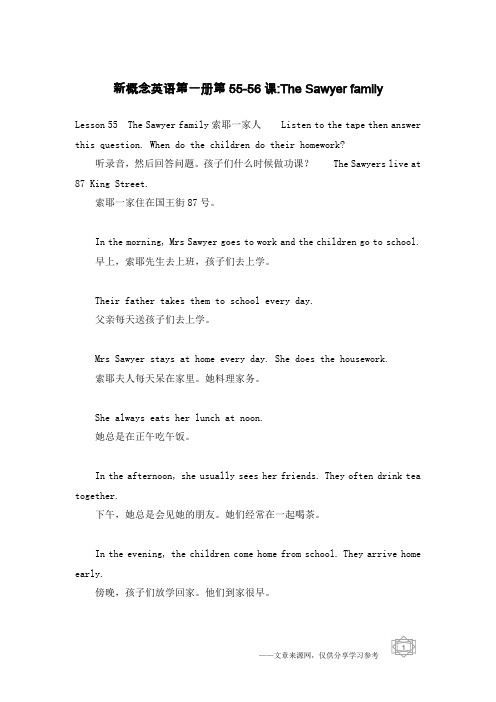
新概念英语第一册第55-56课:The Sawyer familyLesson 55 The Sawyer family索耶一家人Listen to the tape then answer this question. When do the children do their homework?听录音,然后回答问题。
孩子们什么时候做功课?The Sawyers live at 87 King Street.索耶一家住在国王街87号。
In the morning, Mrs Sawyer goes to work and the children go to school.早上,索耶先生去上班,孩子们去上学。
Their father takes them to school every day.父亲每天送孩子们去上学。
Mrs Sawyer stays at home every day. She does the housework.索耶夫人每天呆在家里。
她料理家务。
She always eats her lunch at noon.她总是在正午吃午饭。
In the afternoon, she usually sees her friends. They often drink tea together.下午,她总是会见她的朋友。
她们经常在一起喝茶。
In the evening, the children come home from school. They arrive home early.傍晚,孩子们放学回家。
他们到家很早。
Mr Sawyer comes home from work. He arrives home late.索耶先生下班回家。
他到家很晚。
At night, the children always do their homework. Then they go to bed.晚上,孩子们总是做作业,然后去睡觉。
新概念英语一册55-56课练习

一.根据所给中文意思补全单词。
1.l__v__ (住,生活)2.st__ __ (呆在,停留)3.h__m__ (家,在家)4.h__ __sew__ __k (家务)5.l__ __ch (午饭)6.a__t__ __n__ __n (下午)7.u__u__ll__ (通常)8.t__g__th__ __ (一起)9.ev__n__ __ __ (晚上)10.__rr__v__ (到达)11.n__ __ __t (夜间)二.用所给词的适当形式填空1. She usually __________her lunch at school. (eat)2. We ____________an English test every week. (have)3. What are you ____________tomorrow? (do)4. Look, the boy _____________on the road. (cry)5. My father _____________very hard. (work)6. Linda always ___________at home on Sundays. (stay)7. The sun _____________in the east. (rise)8. They often ___________kites in spring. (fly)9. It's six o'clock. My mother _____________. (cook)10. Mr. Sawyer sometimes _____________his newspaper at night. (read)11. The Sawyers ______ at 87 King Street. (live)12. Mr. Sawyer ______ to work in the morning. (go)13. We are from Germany, but Dimitri ______ from Greece. (come)14. The father ______ his children to school now. (take)15. Mrs. Smith ______ at home every day. (stay)16. The girl can ______ the vase on this table. (put)17. Mr. Sawyer usually ______ his newspaper at night. (read)18. We are going ______ the flowers to the teacher. (send)19. I can’t go now. I must ______ my homework. (do)20. Look, they ______ (work) hard.三.单项选择。
新概念英语NCE1_Lesson55-56(共25页)课件

What does Mrs.Sawyer do in the afternoon?
What do the children do at night ? What does Mr.Sawyer do at night ?
2
Listen to the tape ,then answer the question !
When do the children do their homework?
At night
3
Look at the pictures,answer the question
What do they do?
18
The answers(2)
He goes to work in the morning. She does the housework in the
morning. She sees her friends in the
afternoon. They do their homework at night. He reads his newspapers at night.
Lesson55 The Sawyer family
主讲:高翠
1
教学目标
Newwords:live,stay,home,housework,lunch,aftern oon,usually,together,evening,arrive,night
Phrases:go to work,stay at home,do the housework,drink tea,arrive home,do the homework,go to bed,read newspapers、go to school、watch TV 、eat lunch The target languages:They live at 87 King Street. She does the housework in the morning.
新概念英语第一册_55_56课课件

eg :My best friend and I live together. eg :We sometimes drink coffee together.
evening n. 晚上
一般指下午以后和上床睡觉前 这段时间比night的时间要早。 night 一般指夜里
night n. 夜间
good night 晚安 at night 在夜里 all night along 一整夜
arrive v. 到达
arrive in 后面一般接城市或国家 arrive in France arrive 后面可直接加副词 arrive here arrive there arrive home arrive at 后面接的地点,一 般是公共场所或某座大楼。 arrive at the hotel
sework n. 家务 h n. 午饭 ernoon n. 下午
usually adv. 通常 together adv. 一起 evening n. 晚上 arrive v. 到达 night n. 夜间
live v. 住,生活(是指长久的居住,住在自己家中)
eg: where do you live ? 你住在哪里?
reads her
milk
eats her lunch newspaper
Bye---bye!
知识回顾 Knowledge Review
—I usually play on the computer.
dusts the makes the cupboard bed
shaves
listen
cleans the go to bed blackboard
新概念英语第一册 Lesson55-56 课 (共19张ppt)
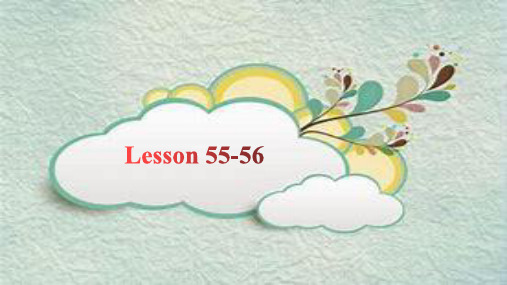
In the evening,the children come home from school. They arrive home early. Mr. Sawyer comes home from work. He arrives home late. At night ,the children always do their homework,then they go to bed. Mr.Sawyer usually reads his newspaper, but sometimes he and his wife watch television.
every day ; on Sundays…
am is are 动词原形、动词的三单形式
动词三单式
1. 一般情况词尾+s 2. s(随) sh (时) ch (出) x(现) o(哦)结尾的动词,后+es 3.以辅音字母+y结尾的词 ,先变y为i, 再+es 4.以元音字母+y结尾的词 ,直接+s
In the evening,the children come home from school. They arrive home early. Mr. Sawyer comes home from work. He arrives home late. At night ,the children always do their homework,then they go to bed. Mr.Sawyer usually reads his newspaper, but sometimes he and his wife watch television.
The Sawyers live at 87 King Street. In the morning,Mr.Sawyer goes to work and the children go to school. Their father takes them to school every day.Mrs. Sawyer stays at home every day.She does the housework. She always eats her lunch at noon. In the afternoon,she usually sees her friends. They often drink tea together.
- 1、下载文档前请自行甄别文档内容的完整性,平台不提供额外的编辑、内容补充、找答案等附加服务。
- 2、"仅部分预览"的文档,不可在线预览部分如存在完整性等问题,可反馈申请退款(可完整预览的文档不适用该条件!)。
- 3、如文档侵犯您的权益,请联系客服反馈,我们会尽快为您处理(人工客服工作时间:9:00-18:30)。
or have milk, pancake.
通常吃烤面包、麦片及咖啡,或者还有牛奶、煎饼。
Lunch
Lunch time is usually in the 12:00 to 14:00, and
sometimes more late.
Lunch is also relatively simple. Many work, school personnel from home with rice Levin, or buy fast food to fast food shops, food content is often sandwiches, hamburgers, plus a drink.
午餐也比较简单。许多上班、上学人员从家中带饭莱,或是到快餐店 买快餐,食物内容常常是三明治,汉堡包,再加一杯饮料。
Dinner
Dinner is a more Americans pay attention to a meal in the evening around 6:00, ate the main course of a steak, fried chicken, ham, plus
The Sawyers live at 87 King Street.
索耶先生一家住在国王街87号。 1. the Sawyers 是指索耶一家。 在英文中,姓 氏后面加-s,前面加上定冠词the,用来指一家人, 特别是丈夫和妻子。例如:the Smiths.
2. live in 住在……(国家或城市) live at 住在……(有确切地址的 小地方)
Lesson55
The Sawyer family
new words
live
[lɪv]
v. 住,生活
stay
home
[steɪ]
[həʊm]
v. 呆在,停留
n. 家;adv. 到家 n. 家务 n. 午饭 n. 下午
housework lunch afternoon
['haʊswɜːk] [lʌnʃ] [ɑːftə'nuːn]
breakfast supper/dinner
The eating habits of Americans
美国人的饮食习惯
Breakfast
Breakfast time, the general in 8:00 They always eat baked bread, cereal and coffee,
stay
呆在、停留
together
evening
一起
晚上
home 家
housework 家务
lunch 午饭
arrive
night到达夜晚来自afternoon 下午
The text
Let’s learn the dialogue:
First listen to the tape and answer this question.
In the morning, Mr. Sawyer goes to work and the children go to school.
Mrs. Sawyer stays at home every day. She does the housework. She always eats her lunch at noon.
vegetables, a staple food such as rice or noodles.
晚餐是美国人较为注重的一餐,在傍晚6时左右开始,常 吃的主菜有牛排、炸鸡、火腿,再加蔬菜,主食有米饭或 面条等。在晚饭时一般都会先来一份果汁或是浓汤,然后 再上主菜。
Other food
fruits 、 salad 、 meat 、 fish 、 potatoes 、 rice 、 noodle and so on
At night, the children always do their
homework. Then they go to bed. Mr. Sawyer usually reads his newspaper, but sometimes he and his wife watch television.
In the evening, the children come home from school. They arrive home early.
Mr. Sawyer comes home from work. He arrives home late.
arrive是不及物动词,后面不能直接跟名 词作宾语,我们通常加上一个介词。 arrive in 到达……(大地方) arrive at 到达……(小地方)
此段使用的是哪个时态? 上文中出现了几个动词?分别是哪些? 这些动词的共同点是什么?
In the afternoon, she usually sees her friends. They often drink tea together.
下午,她总是会见她的朋友。 她们经常在一起喝茶。 一般现在时的用法: 当主语是第三人称时,它的构成是:? 当主语不是第三人称时,它的构成是:?
some sweetfood (cake、pie、cookie、ice cream)
餐饮礼仪
1. 用餐前,你要简单梳妆一下自己,既不要太正统,也不要太随便。 2. 用餐时,把碗碟、刀叉平放好,左手用叉,右手用刀。 3. 美国人习惯喝点加冰的饮料、葡萄酒,大型宴会喝鸡尾酒。一般不喝烈性 酒。喝酒,不能大口大口的喝,不能发出响声。同样吃饭时也尽量不要发出 响声。否则,他们认为是不雅观的行为。 4. 用餐结束时,要把你用过的餐具整理好,放在你原来的位置上,并把剩下 的东西收拾干净。
1. live 住、 生活 live in 住在……(国家或城市) live at 住在……(有确切地址的小地方) at 58 Zhonghua Road. I live —— He lives ___ in England.
2. stay 呆在、停留 stay at home stay with sb. 呆在家 和某人呆在一起
Fill in the blanks and try to retell the story. King Street The Sawyers live at87 ____________. In the morning, Mr. goes to work go to school Mrs. Sawyer _____________.The children ___________. Sawyer ______________and _________________.At noon, stays at home does the housework Mrs. Sawyer _________at home. eats lunch sees her friends In the afternoon, Mrs. Sawyer usually______________. They often__________together. In the evening, the drink tea arrive home early. Mr. Sawyer ______home children __________ late. arrives At night, the children always_________________. Then do their homework go to bed they____________ Mr. Sawyer usually______ reads his newspaper.Sometimes he and his wife_________. watch TV
3. At noon, who always eats lunch at home? Mr. or Mrs. Sawyer? Mrs. Sawyer. 4. In the afternoon, what does Mrs. Sawyer usually do? What do they often do? She usually sees her friends. They often drink tea together.
3. housework 家务 house n. 住宅;家庭 do the housework 做家务 work n. 工作
4. lunch 午饭
have lunch 吃午饭
I often have lunch at 12:30. has He usually _______ lunch at school.
5. In the evening, do the children arrive home early? Yes, they do. 6. At night, what does Mr. Sawyer usually do? What does he sometimes do with his wife? Mr. Sawyer usually reads his newspaper. Sometimes he and his wife watch television.
My father will arrive ____ in London tomorrow. I often arrive ____home early in the evening. /
Let’s read and remember the new words:
live 住、 生活 usually 通常
5. afternoon 下午 in the afternoon evening 晚上 night 夜晚 在下午 在晚上 在夜晚
